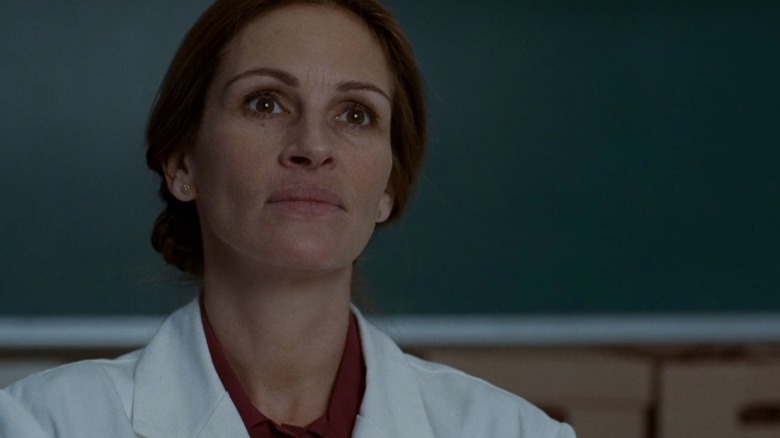Ryan Murphy may be in the news these days for his bad Menéndez brothers fanfic, but a decade ago, the filmmaker had just dropped one of the best and most acclaimed works of his career. “The Normal Heart,” an HBO film based on the semi-autobiographical 1985 Larry Kramer play, won two Emmys, two Critics Choice Awards, and the Humanitas Prize. They were accolades the film deserved. As a portrait of the HIV/AIDS epidemic and both those who survived it and those who didn’t, “The Normal Heart” was moving, political, and original in its take on a much-discussed time period.
It was also a true actor’s showcase, led by Matt Bomer, Taylor Kitsch, and Mark Ruffalo with a scene-stealing, fiery performance from Julia Roberts. Except, Roberts almost didn’t take the role. In an interview with HBO from the time, she admitted that she turned down the part of Dr. Emma Brookner (who is based on real-life HIV/AIDS researcher Dr. Linda Laubenstein) twice before finally deciding to take part in the film. “This is a project that’s been brought to me three times,” she explained. “I just didn’t connect to the character I was being asked to play.”
Dr. Laubenstein made groundbreaking contributions to AIDS research, recognizing that the virus was related to the Kaposi’s sarcomas (cancerous lesions) that gay men and others were appearing with in the early ’80s and eventually becoming an activist in her own right. Laubenstein died in 1992 at the age of 45, having survived polio in her childhood. Upon her death, Kramer told The New York Times: “She is incredibly important in the history of AIDS, a genuine pioneer and a real fighter for what she believed.” Her slightly fictionalized counterpart, Dr. Brookner, is a blunt woman who Roberts described as appearing to have “no bedside manner” whatsoever. Just as it takes the audience some time to understand where Brookner is coming from, it took Roberts a while to warm up to Brookner.
It took three tries for Ryan Murphy to get Julia Roberts on board The Normal Heart
In an Entertainment Weekly piece from the time, Roberts attended a Television Critics Association panel and admitted she originally didn’t want to play the researcher because of what the outlet described as “a lack of understanding about the character.” Ultimately, it was a documentary about the childhood illness that informed so much of Dr. Laubenstein’s life that changed her mind. “I ended up watching a documentary on polio because the character I play was one of the last victims of polio in the country,” Roberts explained in the HBO interview. “All of her motivation, all of her anger and relentless pursuit of some kind of answer and hope made perfect sense to me, and it all clicked and came together.”
At the TCA panel, Roberts said that the documentary “unlocked the door to who this woman is” to her, helping her trace the doctor’s “ferocious pursuit of correctness” back to her own experience with a virus. With a decade’s retrospect, Roberts’ reasoning seems quaint; after all, after the emergence of coronavirus, we’ve now all had personal experience with a debilitating virus that changed the world. Roberts took the role (“That’s when Ryan [Murphy] received what he always gets, which is the answer he wants,” she joked at the TCA panel) and made it her own. Her performance in the film is vital, alternately quiet and controlled and fiercely impassioned. As one of Murphy’s least showy, most impactful works, “The Normal Heart” has fallen out of cultural conversations in the last few years, but it shouldn’t. It’s a career high point for every actor involved, Roberts included.



